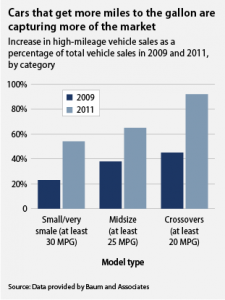A car’s gasoline mileage is such an important factor for many buyers because of course more mileage means less money you have to spend. So when it comes to car efficiency, it is no surprise that there is a constant push to improve this factor. In addition to increased savings, another reason their is much promotion for better fuel efficient cars is because of the environmental impact it can have. If the efficiency is increased, this reduces the amount of pollution released by the car per mile. In addition to changing exterior features, another side of the fight to improve efficiency will happen gradually over time as engines and other internal hardware are improved.
With agencies increasing the minimum mpg on cars every year, automakers must think of quick, easy, and cheap options to increase these factors.So rather than investing money on expensive new technologies they are researching on ways to reduce the weight of cars, thus increasing fuel effieciency, without sacrificing safety and other important features. While choosing alternate materials, a factor automakers always keep in mind is the price. Advanced steels are a more expensive type of steel, but researchers are trying to partner cheaper and much lighter materials with this advanced steel in order to decrease the weight of the car overall. Aluminum is one material of focus for being durable, three times lighter than steel, and much cheaper. Another possible material is a polymer foam. Once the ideal material is chosen the next important step to follow would be shaping the new materials without damaging them. There is still more research to be done.
Obama, if you do not already know, is known for his Clean Power Plan where he wishes to reduce the amount of carbon emissions into the atmosphere. Being a smart man, one of his major focuses was the auto industry, one of the largest culprits of pollution. Obama has set many standards for car efficiency in the upcoming years, and has even set a plan to increase the minimum car mpg to 54 mpg by the year 2025, a modest goal. Obama’s plan has increased automotive sales, will increase fuel economy, decrease oil consumption, increased international competition, and even create more jobs for finding new methods to improve efficiency

Higher mpg cars of course are more appealing to customers because it means less money to spend for the consumer. As these higher mpg vehicles become cheaper to produce, they will control a larger part of the market, just as the graph displays.
Changing the exterior of a car will indeed help to improve efficiency, but we can not overlook the importance of the hardware. One feature that must be improved upon is the engine. I am no car expert, but a car engine is a complex motor that powers the cars. Without the engine the car won’t move. There are many parts to an engine, and researchers are trying to figure out how to minimize the fuel consumption of the engines by only turning on the parts of the motor that are absolutely necessary at certain times. Going up hill would require more power going to the engine, versus going downhill. Another good feature that some electric and hybrid cars already have is a stopping system which automatically turns off the engine when the car is stopped. So waiting at a stop light will use zero power, an addition whose benefits would add up over time. Another important advancement is a turbocharger. I won’t bore you with all the technical details of how it works, but I’ll simplify it. How often do you see a car go by and the muffler is releasing fumes? Those fumes are the wasted gases produced. What the turbocharger does is recycle these fumes which normally have no other use besides polluting the air and turns it in extra power for the engine.

There is still much to improve on in car’s efficiency, and for once automakers want to improve their own business by appealing to consumers will benefit us and the planet
References
- Veen, Chad. “How Will U.S. Automakers Achieve 54.5 MPG?” How Will U.S. Automakers Achieve 54.5 MPG? N.p., n.d. Web. 09 Oct. 2015. <http://www.govtech.com/technology/How-Will-US-Automakers-Make-Cars-More-Efficient.html>.
- Villareal, Antonio. “Lighter Cars, More Efficient Cars | 2010 | Research | College of Engineering.” Lighter Cars, More Efficient Cars | 2010 | Research | College of Engineering. N.p., n.d. Web. 09 Oct. 2015. <https://engineering.tamu.edu/research/2010/lighter-cars-more-efficient-cars>.
- Weiss, Daniel. “5 Ways the Obama Administration Revived the Auto Industry by Reducing Oil Use.” Name. N.p., n.d. Web. 09 Oct. 2015. <https://www.americanprogress.org/issues/green/report/2012/08/27/34054/5-ways-the-obama-administration-revived-the-auto-industry-by-reducing-oil-use/>..
this blog was very interesting and it went into detail that made the reader more aware of what the topic was and what is being done to improve the efficiency of cars. Also the pictures that were used were helpful and interesting. they brought the blog together as a whole.